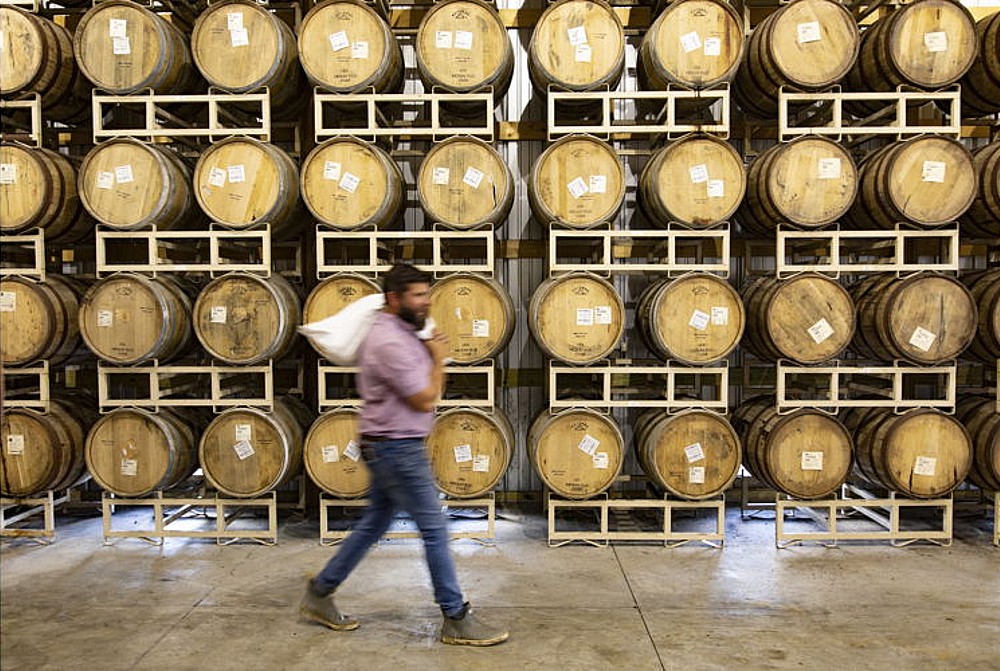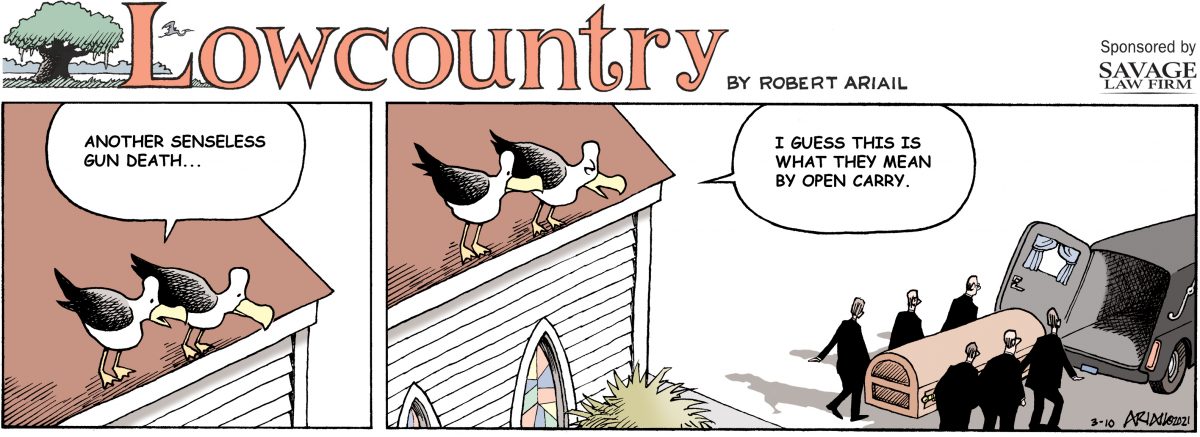STATEHOUSE REPORT | ISSUE 20.11 | MARCH 12, 2021
BIG STORY: S.C. distilleries fight for fairness in legislature
NEWS BRIEFS: Hate crime bill stripped of LGBTQ, other protections
LOWCOUNTRY, Ariail: What “open carry” means
COMMENTARY, Brack: Why budget reporting matters
SPOTLIGHT: S.C. Senate Democratic Caucus
FEEDBACK: Send us your thoughts
MYSTERY PHOTO: Another bridge
S.C. distilleries fight for fairness in legislature

By Parker Milner, special to Statehouse Report | South Carolina has 28 micro-distilleries, none of which can serve customers after 7 p.m. or on Sundays like breweries and wineries can. In fact, these small businesses can only sell their own brands of liquor. And they can’t serve food or a cold beer.
The puzzling restrictions faced by the state’s distilleries, which say they support 20,000 South Carolina jobs, are causing even more damage to a group that, as sales slowed to a trickle during the pandemic, shifted operations to produce much-needed hand sanitizer. But, a bipartisan bill sponsored by nearly 30 state lawmakers could address what spirits industry leaders say is a fundamental issue of fairness.
“When we looked at parity, and that’s the main thing we are looking at is partial parity with the breweries, most legislators that we’ve talked to have said, ‘That makes sense,’” said High Wire Distilling owner Scott Blackwell of Charleston. “(Distilleries) are great for the community, they employ people, and are places where a lot of people take their dog and kids. The breweries get a lot more locals because of the friendliness of the laws. Without tourists in this town, it’s crushing.”

Blackwell serves as president of the South Carolina Distillers Guild, a three-year-old group of volunteers that’s been fighting for parity since its inception — the pandemic made its mission more urgent, Blackwell said. High Wire, Charleston Distilling Co., Twelve 33 Distillery, Palmetto Distillery, Six & Twenty and Burnt Church Distillery are leading the charge to get the S.C. Micro-Distillers Parity Act, H.3769, signed into law by this summer.
The Distillers Guild didn’t include everything on its wish list in the bill, filed in the state House and Senate, but it does address many of the limitations placed on the business. Currently, South Carolina distilleries are treated like liquor stores, meaning hours of operation are limited to 9 a.m.-7 p.m. Monday through Saturday.
“We’d like to be open on Sundays and stay open a little later — another hour or so,” said Charleston Distilling Co. owner Steve Heilman, who serves as the guild’s treasurer. “Not too many people want to go drinking at 9 a.m.”
Although several distillers in the state also want to extend bottle-sale hours and push for other items like self distribution, Blackwell said, the Distillers Guild came up with “realistic” requests in the bill. The big-ticket items include:
- Expand hours to seven days a week, but follow Sunday retail sales restrictions;
- Allow outside beer and wine for on-premise consumption;
- Increase the tasting limit from 3 ounces to 4.5 ounces;
- Allow tastings to occur in tasting rooms, with food; and
- Increase the amount of liquor to be sold for off-premises consumption from 3 bottles to 9 liters.

Republican Sean Bennett of Summerville, the Senate bill’s lead sponsor, helped S.C. breweries pass the so-called Stone and Pint bills, which increased the amount of beer breweries could sell and patrons could consume onsite. Bennett started working with the distilleries toward the end of 2020, before filing the bill in January, he told the Charleston City Paper.
“I’m really relatively hopeful, mainly because we’re not trying to do anything different. We’re really just trying to bring the micro-distilleries to the same level of parity with the breweries,” Bennett said.
“As an effective advocate for an industry that has a significant footprint in Charleston and North Charleston, my job is to break down the arcane barriers that, in my view, no longer need to exist,” said S.C. Sen. Marlon Kimpson, D-Charleston. “Over the summer, I toured some of these facilities, and to me, them asking to serve food made total sense, particularly when you look out the window and see a brewery able to do the same thing. What this bill does is it essentially closes the gap.”

State Rep. Wendell Gilliard, D-Charleston, is hopeful one of the bills will pass by the April 10 deadline to be considered by the other chamber.
“I believe that competitiveness is always good for business, and to me, that makes all those types of businesses competitive. It’s a win win situation, and I think it’s coming at the right time,” Gilliard told the City Paper.
The bill’s chief sponsor in the House, S.C. Rep. Leon Stavrinakis, D-Charleston, did not respond to requests for comment.
According to the latest statistics from the S.C. Brewers Guild, the number of South Carolina breweries has more than tripled since 2013, meaning more production, distribution and revenue for brewers and distributors. Still, Bennett knows the bill will face opposition from liquor distributors, who think the relaxed laws will dip into their margins. He said he hoped they will realize that making distilleries more viable businesses will help the industry as a whole.
“We have some pretty strong pushback from people participating in the three-tier system,” said Bennett, referring to the state’s system that requires alcohol distributors to serve as middlemen between wholesalers and retail businesses. “The beer distributors are probably in agreement that it’s helped their industry. We’ve got a good story to tell.”
Why it matters
At small distilleries, there could be a large uptick in sales if the bill is passed, Nippitatty Distillery owner Traxler Littlejohn told the City Paper.
“It would mean the world to us, because it increases a huge revenue stream. Right now, even during COVID, our overall sales in the tasting room dropped, but people were still coming by to do a tour and grab a bottle,” said Littlejohn. State regulations prohibit consumers from buying more than three bottles directly from a liquor producer. “This (would) allow us to sell more bottles.”

Scott Newitt, an owner of Firefly Distillery in North Charleston, led the S.C. liquor industry out of the dark ages in 2007, helping to push legislation that allowed tasting inside distilleries and lowered the cost of opening a distillery. He said opening distilleries on Sundays is the next logical step as Charleston looks to reignite its tourism industry post-pandemic.
“It’s all about being open when tourists are here, so the ability to be open on Sunday is a big deal. That would be great for tourism for us and promote South Carolina products,” said Newitt. Currently, when Firefly closes at 7 p.m., Newitt’s customers can walk around the corner to Holy City Brewing, which operates a full-service restaurant and bar until 10 p.m. nightly — with Firefly, Nippitatty and High Wire spirits on the menu.
“I just want people to be able to come sample my brand at my place,” Newitt said.
Blackwell can hardly contain his frustration when talking about the current laws facing local distilleries. It’s time South Carolina provided relief for distilleries like other states have throughout the pandemic, he said.
“It’s kind of maddening, so I’m pretty passionate about this. Your neighboring states are doing it already. These states are way beyond where we are,” Blackwell said. “(Distilleries) have to pass more background checks than any bar or restaurants and are not allowed to do a fifth of what they do.”
Parker Milner is a reporter with the Charleston City Paper. Have a comment? Send to: feedback@statehousereport.com. Make sure to add your name and contact information for verification.
Hate crime bill stripped of LGBTQ, other protections

By Sam Spence, special to Statehouse Report | South Carolina’s LGBTQ community may not be protected by a proposed hate crime law after a Republican-controlled S.C. House subcommittee stripped provisions that would strengthen penalties for crimes committed because of gender and sexual orientation, observers say.
As originally proposed, H.3620 calls for protections for people victimized because of their “race, color, creed, religion, sex, gender, age, national origin, ancestry, sexual orientation, or physical or mental disability.” A House subcommittee unanimously approved an amendment Thursday that removed language related to sexual orientation, creed, gender, age and ancestry.
S.C. Rep. Chris Murphy, R-North Charleston, told a House Judiciary subcommittee the amendment was designed to give the bill a better chance of passing the House before the April 8 deadline to be considered in the Senate.
“I think this amendment will go a long way to alleviating a lot of the concerns of our membership,” Murphy said, not referring to any specific concerns.
Thursday’s move came as lawmakers in the House and Senate consider prohibitions on transgender youth participation in school sports and penalties for doctors who provide some medical care for transgender minors.
South Carolina is one of three states in the U.S. without a law that adds penalties for crimes motivated by hate. Over the past year, a bipartisan group of lawmakers and statewide business groups like the South Carolina Chamber of Commerce have called for leaders to pass a hate crime law.
FBI statistics show about 17 percent of hate crimes committed in South Carolina in 2019 were motivated by sexual orientation, gender or gender identity, three of the protected classes removed with Murphy’s amendment Thursday.
“This is just disappointing,” said S.C. Rep. Beth Bernstein, D-Columbia, another bill sponsor, according to the Associated Press.
The Charleston-based Alliance for Full Acceptance said Thursday it would not put its support behind the proposed bill in its current form.
The bill heads to the full House Judiciary Committee next, where members could choose to reinstate its original language.
(Sam Spence is editor of the Charleston City Paper.)
In other recent news:
![]() Judge allows McMaster, Lucas to intervene in abortion law case. A federal judge allowed SC Gov. Henry McMaster and House Speaker Jay Lucas to enter an ongoing lawsuit Tuesday contesting the state’s new anti-abortion fetal heartbeat law. More: The State.
Judge allows McMaster, Lucas to intervene in abortion law case. A federal judge allowed SC Gov. Henry McMaster and House Speaker Jay Lucas to enter an ongoing lawsuit Tuesday contesting the state’s new anti-abortion fetal heartbeat law. More: The State.
House approves ‘step’ raises for teachers. The S.C. House gave unanimous approval Wednesday to a proposal greenlighting public teachers’ small annual raises that were stalled by budgeting in the pandemic. The proposal is now heading to Gov. Henry McMaster’s desk. McMaster has expressed support for the bill. A lump sum covering the entire school year could be in teachers’ checks by June 15. More: AP News.
U.S. House passes Clyburn’s gun fix for Charleston loophole. The U.S. House Thursday passed Congressman Jim Clyburn’s bill to enhance background checks for gun purchases in a 219-210 vote. More: The Post and Courier.
Interstate road hogs face stiffer fines. Drivers on South Carolina interstates who travel persistently in the left lane could soon be liable for prison time and boosted fines as lawmakers seek to cut down on contributors to highway wrecks. More: The Post and Courier
S.C. senators want you to know how legislature spends your money. Some lawmakers want to make it easier for the public to follow the flow of state taxpayer dollars to the programs and special projects they fund. More: The State
House approves elections tweak along party lines. The S.C. House voted 84-36 Wednesday in a key vote that requires counties across the state to follow the same rules for elections. The bill seeks to enforce uniform rules on how votes are cast and absentee ballots counted across the state. The bill needs a routine vote before heading to the Senate. Gov. Henry McMaster has expressed support for it. More: AP News
Overdose reversal medication proposal gets nod. A proposal that would require opioid prescribers to also prescribe an overdose reversal medication was approved by the South Carolina Senate Wednesday. More: Charleston City Paper
S.C. House passes curbside alcohol pickup, beer delivery bills. The South Carolina House on Thursday gave key approval to a pair of bills that make it easier to have beer and wine delivered to homes and to pick up alcoholic drinks. Source: AP News
McMaster names first S.C. chief resilience officer. S.C. Gov. Henry McMaster named the man who will lead the state’s Office of Resilience. More: WIS TV.
What “open carry” means

Here’s a new cartoon by Robert Ariail that first was published in our sister newspaper, the Charleston City Paper. Love it? Hate it? What do you think: feedback@statehousereport.com.
Why budget reporting matters

By Andy Brack, editor and publisher | Media have gotten so streamlined that only one newspaper wrote a story last week when the S.C. House Ways and Means Committee approved a $9.8 billion budget.
 That’s billion with a “B.” And that “B” means that it matters. But without reporters meticulously covering what’s going on with your state tax dollars throughout the whole process — and not just at the end when all of the deals have been cut — then there’s a better likelihood that someone will stick a pet project or two in the budget.
That’s billion with a “B.” And that “B” means that it matters. But without reporters meticulously covering what’s going on with your state tax dollars throughout the whole process — and not just at the end when all of the deals have been cut — then there’s a better likelihood that someone will stick a pet project or two in the budget.
“When every daily newspaper had a Columbia bureau, competition was fierce,” recalled Sid Gaulden of West Columbia, who staffed a bureau with me years ago. “Everyone wanted to beat everyone else on just about every story – big or small. Unfortunately with the demise of The State, coupled with the lack of bureaus from Spartanburg, Greenville and even Myrtle Beach, no longer does that competition exist.” (Note: The State was the newspaper that wrote the 2021 budget story!)
It’s a sad state of media affairs, but it should be expected as newspapers cut budgets and people to cover the Statehouse. There may be another reason too — a new breed of editor has probably bought into a long-held belief that people don’t care about stories with numbers in them, which is something also perpetuated by some lazy reporters who don’t like math.
What’s even more disconcerting about the whole mess is press officials across the country celebrate Sunshine Week starting March 14 to pay tribute to the importance of free public information at a time most outlets aren’t covering the budget, one of the biggest and more important bits of free information there is.
In the old days of 30 years ago, a phalanx of reporters covered the Statehouse with a thirst for breaking news and beating the other guy. There were budget stories all over the place. Yes, they were hard to put together and often, there seemed to be no need for them. But it was important to get legislators on the record to make sure they had the people’s interest at stake.
“I also remember being competitive with the other reporters to be the first to find suspicious line-items [in the budget],” said former Associated Press reporter Trip DuBard. “They were like loose strings — if you pulled them, the seam came undone and someone’s pants fell down. And yet, every year they’d slide another one in.”
Budget-related stories can have impact. Remember when cell phones were all the rage? It was a status symbol for someone to have a car phone or a bag phone. After churning out dozens of Freedom of Information requests to state agencies, it was easy to spot abuse — officials who were spending thousands of state dollars on cell phones, including one guy who spent beaucoups of state dollars calling his wife many nights on long drives to his home.
“While I can’t claim to have inside knowledge, I get a strong impression the TV stations here are not staffing legislative coverage on a sustained basis,” said retired TV reporter Jack Kuenzie of Columbia. “Management had zero interest in process/policy stories with sound from suits. Bad TV.”
Gary Karr, who worked for The Greenville News before going to the AP, said he recalled sitting in the House Ways and Means committee room for hours as lawmakers plowed through the various departments.
“Budgets are the main way governments express their priorities, so it’s sad to see that the day-in day-out government process stories get such short shrift,” said Karr, who later worked as a spokesman for David Beasley when he was governor.
DuBard enjoyed the “treasure hunt (that) it was to find the baloney in the budget.”
At one point, two senior Democratic state Senate budget writers, both of whom are dead, blocked DuBard from attending a budget subcommittee meeting
“When it was finally released, there was — as I remember — a tax increase [Sen. James] Waddell had slipped in … Robert Ariail had a great cartoon showing Waddell and [Sen. Jack] Lindsey feeding the taxpayer into a sausage-making machine. The result was that they had to back down and retract the tax increase.”
Budget stories matter. Let’s demand more so we can all follow the money.
Andy Brack is editor and publisher of Statehouse Report. Have a comment? Send to: feedback@statehousereport.com.
S.C. Senate Democratic Caucus
 The public spiritedness of our underwriters allows us to bring Statehouse Report to you at no cost. This week’s spotlighted underwriter is the S.C. Senate Democratic Caucus. Organized almost 25 years ago, the Caucus has played an important role in many of the historic issues facing our state. As a vibrant minority party in the Senate, its role is to represent our constituents and present viable alternatives on critical issues. The S.C. Senate Democratic Caucus remains a unique place for this to occur in our policy process.
The public spiritedness of our underwriters allows us to bring Statehouse Report to you at no cost. This week’s spotlighted underwriter is the S.C. Senate Democratic Caucus. Organized almost 25 years ago, the Caucus has played an important role in many of the historic issues facing our state. As a vibrant minority party in the Senate, its role is to represent our constituents and present viable alternatives on critical issues. The S.C. Senate Democratic Caucus remains a unique place for this to occur in our policy process.
- Learn more about the Caucus at: www.scsenatedems.org.
Send us your thoughts
We love hearing from our readers and encourage you to share your opinions. But to be published, you’ve got to provide us with contact information so we can verify your letters. Letters to the editor are published weekly. We reserve the right to edit for length and clarity. Comments are limited to 250 words or less. Please include your name and contact information.
- Send your letters or comments to: feedback@statehousereport.com
Another bridge

What’s the name of this bridge … and where is it? Send your guess to feedback@statehousereport.com — and remember to include your name, home city and contact information.
 Last week’s mystery, “Where is this bridge?” is a swing bridge over the Intracoastal Waterway in Little River. It is named for Captain Archie Neil “Poo” McLauchlin, a well-known local mariner.
Last week’s mystery, “Where is this bridge?” is a swing bridge over the Intracoastal Waterway in Little River. It is named for Captain Archie Neil “Poo” McLauchlin, a well-known local mariner.
Congratulations to several people who correctly identified the photo sent in by reader Wayne Beam of Clemson: Jay Altman and Elizabeth Jones, both of Columbia; George Graf of Palmyra, Va.; Bill Segars of Hartsville; Elaine Huff-Lowe of Inman; Jacie Godfrey and Barry Wingard, both of Florence; David Lupo of Mount Pleasant; Allan Peel of San Antonio, Texas; Steve Willis of Lancaster; and Debbie Causey.
Graf provided more info: “Archie McLauchlin is a lifelong resident of the North Strand, known by many in the North Myrtle area. When he was a baby, his father took him to see the opening of the bridge that bears his name. He was a large infant, and his sister gave him the nickname ‘Poo’ after an early 1930s cartoon character known as ‘Poo the Giant.’
“He grew up along the Intracoastal Waterway and made a career out of being a Coast Guard certified captain after serving in the Air Force. To honor him, a group of community members, who call themselves the Poo Crew after McLauchlin’s old fishing tournament fish crew, have convinced the South Carolina state legislature to rename the swing bridge in his honor.”
- Send us a mystery. If you have a photo that you believe will stump readers, send it along (but make sure to tell us what it is because it may stump us too!) Send to: feedback@statehousereport.com and mark it as a photo submission. Thanks.
ORDER NOW: Copies are in Lowcountry-area bookstores now, but if you can’t swing by, you can order a copy online today.
ABOUT STATEHOUSE REPORT
Statehouse Report, founded in 2001 as a weekly legislative forecast that informs readers about what is going to happen in South Carolina politics and policy, is provided to you at no charge every Friday.
Meet our team
- Editor and publisher: Andy Brack, 843.670.3996
- Special correspondent: Lindsay Street
Donate today
We’re proud to offer Statehouse Report for free. For more than a dozen years, we’ve been the go-to place for insightful independent policy and political news and views in the Palmetto State. And we love it as much as you do.
But now, we can use your help. If you’ve been thinking of contributing to Statehouse Report over the years, now would be a great time to contribute as we deal with the crisis. In advance, thank you.
Buy the book
Now you can get a copy of editor and publisher Andy Brack’s We Can Do Better, South Carolina! ($14.99) as a paperback or as a Kindle book ($7.99). . The book of essays offers incisive commentaries by editor and publisher Andy Brack on the American South, the common good, vexing problems for the Palmetto State and interesting South Carolina leaders.
More
-
- Mailing address: Send inquiries by mail to: P.O. Box 21942, Charleston, SC 29413
- Subscriptions are free: Click to subscribe.
- We hope you’ll keep receiving the great news and information from Statehouse Report, but if you need to unsubscribe, go to the bottom of the weekly email issue and follow the instructions.
- Read our sister publications: Charleston City Paper (every Wednesday) | Charleston Currents (every Monday).
- © 2021, Statehouse Report, a publication of City Paper Publishing, LLC. All rights reserved.















 We Can Do Better, South Carolina!
We Can Do Better, South Carolina!